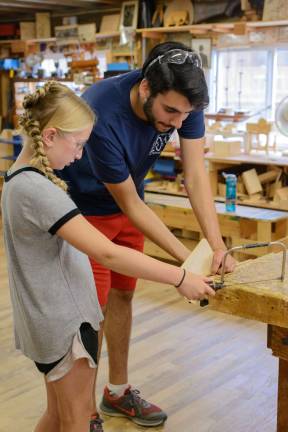A time to unplug

Summer camp has always been a place for children to participate in a myriad of activities, to be out in nature and to form strong friendships, but with the increase in media use among children, it’s apparent that camp is needed now more than ever before. The majority of summer camps don’t allow campers to bring personal media including smart phones, tablets, laptops and TV, making camp one of the last unplugged environments for children and a place for them to take a much-needed break from technology.
According to a Kaiser Family Foundation study, today’s children spend over 7.5 hours a day engaged in media, and that number increases to 10.75 hours a day when children multitask. Children are spending their time tethered to their screens, often indoors instead of outside. Camp allows children to get back to nature, be more active and enjoy their summer outdoors, technology free, instead of on the couch engaged in media.
Excessive technology use has also had an effect on the way children communicate. Young people no longer speak to each other — they text or Snapchat. At camp, children can only communicate face-to-face. Without the use of screens, campers talk in their bunk, at meals, on the sports field and across the table at arts and crafts. Today’s children need the camp environment to improve their communication skills, attributes that 21st century employers say they look for in future employees.
Putting technology to the side also allows for campers to form true friendships. Research by the American Camp Association reports that 96 percent of campers say that camp helped them make new friends and 93 percent of children say camp helped them get to know kids who were different than themselves. Technology doesn’t act as a distraction to campers, so friendships happen easily while eating together, living together at overnight camp and having fun at their activities together. Friends aren’t counted by the number of comments and likes a photo gets but by getting to know each other through conversations and shared experiences.
Taking a break from technology encourages creativity, which LinkedIn just named as a top soft skill that 2019 employers are looking for. While school is great for reading, writing and arithmetic, not enough time is spent being creative. Creativity is celebrated and encouraged each day of camp, from constructing a bench at wood shop to writing a new song for your age group.
Without the use of smartphones or computers, children sit down and send handwritten letters at overnight camp, an almost forgotten art. In 2016, the New York Times published an article, “Why Handwriting Is Still Essential in the Keyboard Age,” with evidence that handwriting engages the mind and helps children pay attention to written language. Writing letters from camp lets children think about what they want to say, instead of just sending quick messages over social media.
There is no doubt that technology is an important part of daily life for young people, but taking time away from it is also imperative for developing important skills needed to become successful 21st century adults.